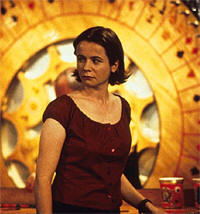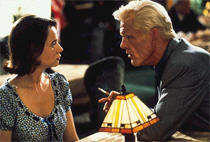 |


|
|
|
|
By John Demetry
As played by Emily Watson, Trixie speaks in hard-boiled malapropisms, earnestly fumbling cliched turns of phrase; example: "You think I got an ace up my hole?" She's an undercover detective at a casino, intent on cracking a big case. She stumbles upon one that involves a cast of dime-store crime novel types-including an impersonation comedian played by Nathan Lane (here impersonating a straight man). The convoluted mystery seems beyond her. The characters underestimate her as a Forrest Gump type (and many critics and audiences have as well). Some characters try to sweet talk her with fancy rhetoric, like the politician played by Nick Nolte, doing the Clinton-tango through a sex scandal. Others manipulate media (videotape, audio recordings, the press) to confound Trixie in her quest. Trixie confronts such double-speak and double-dealings with personal, idiosyncratic (and funny) expressions. Watson's open face reveals every emotion and silent-star eyes register every clue. She delivers a precise, moving characterization of our own modern predicament through Trixie's way of looking at and understanding this topsy-turvy world. A wonderful surprise, Trixie becomes truly heroic.
The mystery plot provides a structure for Rudolph's visually and morally beautiful close ups, point-of-view shots, mirroring effects, and direction of actors. Not to say that this film's pleasures are merely stylistic. Rather, Rudolph is interested in getting us to look beneath surfaces. He develops a unique spiritual Epic cinema. (The closest contemporary in theatrical terms is Tony Kushner's Angels In America. Interestingly, Rudolph's mentor and producer is Robert Altman, who was to direct the film version of Angels.) "Trixie" awakens our awareness to gay-friendly homophobia, the political and cinematic handshake with fingers crossed behind the back. That's the surface-level trickery of politicians and films that display false empathy through concealed motivations to win queer votes at the ballots or at the box-office. Money and power. Politics dressed as entertainment. It's the divide-and-conquer that Trixie exposes and erases. Through Trixie, we come to empathize with the motiviations of every character. We begin to understand the mechanisms that isolate us from others.
"Well, kids, we've succeeded. We're just like them. We are inextricably and undeniably part of the problem. Decades of struggle by us homosexuals has basically amounted to a strip mall where tourists can hold hands and buy rainbow trinkets. San Francisco is over. Now that's a reason to be proud." Beware the movies playing in that strip mall's cinema. Don't get suck'n'fucked by Chuck & Buck or "thumbs-up!"-your-assed by Gladiator. See "Trixie." It recaptures our commodified pride. |

© 1997-2000 BEI
 Emily Watson stars in Trixie
Emily Watson stars in Trixie  Emily Watson and Nick Nolte
Emily Watson and Nick Nolte